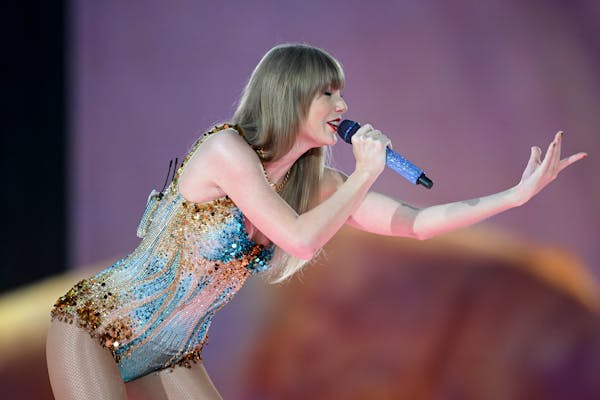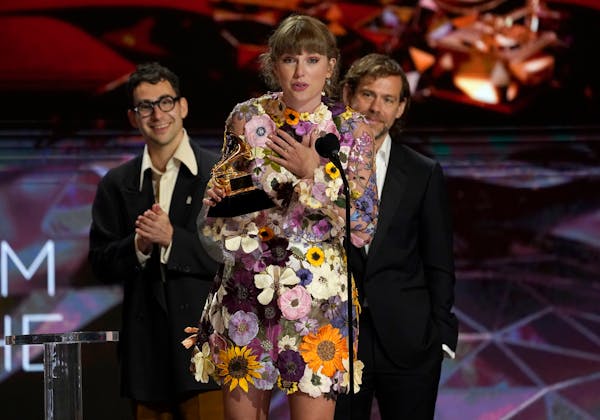She wore a gossamer gown, a faux fur coat, a one-legged, one-armed bodysuit and too many shimmering sequins for a costumer to count. We counted 17 or so different looks for Taylor Swift Friday night at U.S. Bank Stadium.
And 44 songs, 14 dancers, six musicians, four professional backup vocalists, 64,287 volunteer backup singers, three stages connected by a runway, multiple set pieces and giant video screens.
The concert was Taylor Swift on steroids.
And it was wow-inspiringly spectacular at times, wonderfully intimate at other times. Not to mention longer than a major league baseball game (no pitch clock necessary) or any other concert these days. A super-generous 3¼ hours, not including the two opening acts.
Swift's current Eras Tour — 64 stadium gigs this year in North and South America with 38 additional overseas performances in 2024 — will go down as an extraordinary landmark in popular music and not just because of the massive ticket demand (and record-setting prices and grosses) that literally broke the Ticketmaster system.
Swift's conceit is bold and brilliant: grouping songs album by album, nonchronologically, from throughout her 10-LP recording career, which began in 2006. She started Friday with two deep tracks from 2019's "Lover," the first of four new albums she's released since her last tour in 2018, and ended with a set of selections from last year's "Midnights."
When it comes to marathon concerts, Bruce Springsteen, who set a record of 4 hours and 6 minutes (38 songs), may be more impassioned and urgent, Paul McCartney (38 songs) may be more blissfully nostalgic, and we won't experience Beyoncé (34 songs) until July 20 but she's devoting nearly half of her current tour to material from her latest album. In other words, those legends invariably leave fans wanting more — this favorite song or that one.
Not Tay Tay. Her show Friday may be the most fan-fulfilling show I've ever seen in 48 years of reviewing. It's rivaled only by Barbra Streisand's 1994 tour, her first in 28 years, that left her fans verklempt.
At the Vikings stadium, Swifties were overwhelmed and overjoyed. Who can blame them?
Like Streisand, Swift, 33, doesn't miss a detail.
A snake-enveloped microphone during the "Reputation" era, a smoking chimney on the bucolic cabin for "Folklore," a moss-covered grand piano for the foresty "Evermore," and faux snowflakes falling during the lyric "I still remember the first fall of snow" for "All Too Well (10 Minute Version)" from "Red (Taylor's Version)." Yep, a special effect for just one line. Details.
Moreover, Swift knows all too well when and how to pose for a money shot (such cutesy mugging) — be it staff video cameras or up-close fans' smartphones — without ever missing a beat. She is so self-aware but in a good, fan-friendly way.
For each "Era" or album, she chose a color scheme and vibe, whether it was achieved with a set piece (like office cubicles for "The Man" from "Lover") or Broadway-styled production (like the "Cabaret"-evoking group chair dance during "Vigilante [Bleep]" from "Midnights"). Throw in the obligatory confetti and pyro, hydraulic lifts, visual images projected onto the stage floors, costume changes (some before the crowd's very eyes) and a startling special-effects trick in which she appeared to dive from the stage and swim underwater in a video.
As for Swift's singing, which was an issue earlier in her career, she avoided the vocal manipulations heard on her recordings. It was just her natural singing voice, which has grown stronger, richer and supremely confident. (She even unleashed a roof-rattling wail on "Don't Blame Me.") Her dancing was similarly more confident and graceful, though she relied too often on a super-model strut.
What there wasn't was much spontaneity. She sometimes spoke between songs, planned remarks about writing songs during the pandemic and her "passion project" of rereleasing "Taylor's Versions" of her first six albums.
A few beloved songs, like "Fearless" and "You Need to Calm Down," were disappointingly abbreviated. On the other hand, she did manage to play about 20% of all the tunes in her extensive catalog, both deep cuts and hits.
For her two solo "surprise songs" (they aren't performed at other shows), Swift opted for "Paper Rings" on acoustic guitar, valuing love above an engagement ring, and "If This Was a Movie," a track from the deluxe edition of "Speak Now" about a lost love returning to her.
As for highlights, there were many, including the bouncy duo of "You Belong with Me" and "Love Story," the fierce "Look What You Made Me Do," the romantic complications of "Champagne Problems," the intense, impassioned "All Too Well," the irresistible bop of "Blank Space" and "Bad Blood," and the entire seven-selection "Folklore" era, which filled the football stadium with passionate folk music.
Swift's hyper-ambitious show was meticulously calculated (that's the way she always rolls) and studiously practiced (she's an incredibly hard worker) but still came across as fresh as cut flowers. That's because, despite all the spectacle, there was an unspoken intimacy, as if she were speaking directly to individual fans in conversation and in lyrics, addressing loneliness and heartache, offering a reassuring embrace and extending a friendship bracelet of communal belonging — a palpable connectedness.
We all want to be seen and acknowledged, and Swift does that. It's her special karma, which also happens to be the name of her current single and the night's final song.
When the Beatles redefined culture nearly 60 years ago, there were only three national TV stations in the United States. We're now in an era of countless channels, streaming services and social media platforms, yet somehow Taylor Alison Swift — who grew up on a Christmas tree farm in Pennsylvania — has achieved a once unthinkable monoculture, a zeitgeistian redux of Beatlemania — except Swiftiemania is a reaction to a strong woman, not four cute guys — for millennials, Gen Z'ers and their parents.
And Swift, the relentless one, will be back again Saturday night at U.S. Bank Stadium to do it all over again.
Latest updates

Taylor Swift's Eras Tour in Minneapolis

The 5 best things our food writers ate this week

A Minnesota field guide to snow shovels: Which one's best?

Summer Camp Guide: Find your best ones here

Lowertown St. Paul losing another restaurant as Dark Horse announces closing

